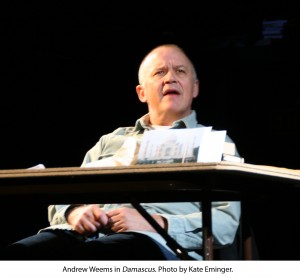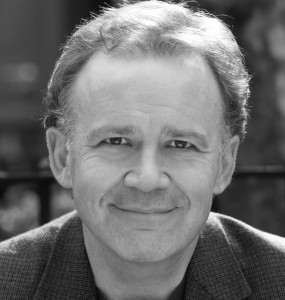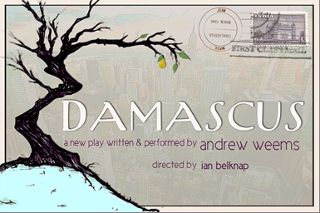MAGNIFICENT CHARACTER ACTOR ON THE BUMPY ROAD TO DAMASCUS
When Andrew Weems enters the stage to perform Damascus, a solo play he also wrote, the 4th Street Theater immediately fills with his rich inner life. Weems is one of the great unsung actors of the American stage, the one whom you took for granted in your favorite Broadway revival. Each accent and physicalization is finely honed from years of treading the boards. His acting craft is flawless, and for three decades, he’s performed in just about every important regional theatre, where his prior solo show Namaste Man was performed. In his youth, he toured with The Acting Company, who is producing Damascus as part of their initiative to showcase their acting alum as writers. The event certainly showcases Weems as an actors’ actor, but as a writer his dramaturgy undermines Damascus. He shows strength in well-observed moments, but the construction needs work, and he often wallows in descriptions, a common misstep for a newer writer loving his words.
 Weems’ face is that rare mask, ready to put on any character that will serve his story – think Bert Lahr performing a Spalding Gray monologue. The character actor has never wanted for range, so it comes as no surprise that Damascus is a world where vivid characters come to life in a global mosaic of multi-cultural voices and points of view. He takes us through a veritable United Nations of humanity, transforming seamlessly from a rodent-like Brit to a nasty Russian landlord; a catastrophizing Irish neighbor to a Korean mom-and-pop store owner. In Weems’ version of America, we are still a melting pot, only without the carrot of the American Dream to inspire us onward.
Weems’ face is that rare mask, ready to put on any character that will serve his story – think Bert Lahr performing a Spalding Gray monologue. The character actor has never wanted for range, so it comes as no surprise that Damascus is a world where vivid characters come to life in a global mosaic of multi-cultural voices and points of view. He takes us through a veritable United Nations of humanity, transforming seamlessly from a rodent-like Brit to a nasty Russian landlord; a catastrophizing Irish neighbor to a Korean mom-and-pop store owner. In Weems’ version of America, we are still a melting pot, only without the carrot of the American Dream to inspire us onward.
Damascus is stuctured in two parts. Part One is Weems’ personal story, a typical downward spiral story of a drunk, the kind you might hear at any neighborhood AA meeting; his tale includes the usual suspects of dysfunctional families, unrequited love, and demoralizing behavior. Before Weems eventually finds the willingness to reach out to AA, he digresses from the drunk-a-logue and structures Part Two around a sobering short story about a man traveling in Southeast Asia “on a long trip to a beautiful place.” The short story is designed to parallel Weems’ journey in Part One, but its epiphany never quite connects the two parts enough to make the device pay off satisfactorily.
 The creative team supporting Weems does its very best to make things work. Ian Belknap does a lovely job with his straightforward, respectful direction, keeping both Weems and the piece focused. The production, subtly supported by the design team, never strays from the idea that there is great power in the simplicity of storytelling. Set designer Neil Patel works with the dirt and deprivation of the less-than-glamorous 4th Street Theater to create the feeling of going through memory-filled boxes in a dusty warehouse. Annie Wiegand and Daniel Chapman’s lights unobtrusively add to the proceedings, creating secret moments of intimacy one minute, then allowing the world back in the next. Fitz Patton and Mark Van Hare’s nonmanipulative sound gives easy access to the exotic, faraway locales. Design teams are sometimes challenged by the limits of solo performance, but I left the theatre aware that each element had imperceptibly enhanced the world of Damascus.
The creative team supporting Weems does its very best to make things work. Ian Belknap does a lovely job with his straightforward, respectful direction, keeping both Weems and the piece focused. The production, subtly supported by the design team, never strays from the idea that there is great power in the simplicity of storytelling. Set designer Neil Patel works with the dirt and deprivation of the less-than-glamorous 4th Street Theater to create the feeling of going through memory-filled boxes in a dusty warehouse. Annie Wiegand and Daniel Chapman’s lights unobtrusively add to the proceedings, creating secret moments of intimacy one minute, then allowing the world back in the next. Fitz Patton and Mark Van Hare’s nonmanipulative sound gives easy access to the exotic, faraway locales. Design teams are sometimes challenged by the limits of solo performance, but I left the theatre aware that each element had imperceptibly enhanced the world of Damascus.
For all of Weems’ talents as an actor, the source material does not lend itself well to dramatic writing. A drunk man in the middle of a downward spiral is hardly someone you want to spend a few hours with, and the only character arc comes in the final moment. Weems needs to be much more selective if he continues on this actor-writer path, because his story gets lost in the forest of details. We are left with an aimless anti-hero with no estimable goals, unlike the character in Part Two’s short story.
Weems’ personal drunken journey ultimately proves unsuitable for a play, so he fills the world with a menagerie of fascinating people. The legerdemain works up to a point, but we are soon aware that one of our finest character actors has given away his own story to more interesting if lesser characters. Without a pro-active main character’s desires driving Weems’ story, we are left with very little to hold onto. While Weems’ choices as an actor in the theatre are always sharp and articulate, his writerly instincts don’t seem to lean in the direction of dramatic incident. Instead of forcing his words to navigate the potholes of theatrical conventions, perhaps personal non-fiction might be a more appropriate vehicle for the road to Damascus.
Damascus
The Acting Company at 4th Street Theater in New York City
scheduled to end on June 24, 2012
for tickets, visit http://www.brownpapertickets.com/event/243586

